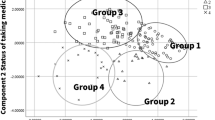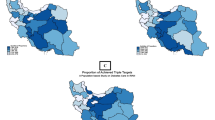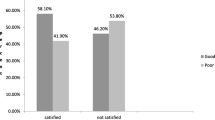Abstract
Aims
Despite the availability of a wide selection of antidiabetic treatments, many patients with type 2 diabetes mellitus (T2DM) still do not have controlled glucose levels. This study aimed to assess illness perception, medication adherence, and glycemic control among primary care attendees with T2DM.
Methods
A cross-sectional study was conducted between July 2019 and November 2020. A random sample of 265 Egyptian T2DM patients were enrolled from primary health-care settings in Port Said, Egypt. Data on socio-demographic characteristics, lifestyle habits, and diabetic medical history were collected using a semi-structured questionnaire. The Brief Illness Perception Questionnaire (B-IPQ) was used to assess diabetes perception, whereas the 8-item Morisky Medication Adherence Scale (MMAS-8) was used to investigate medication adherence.
Results
There was a significant difference in B-IPQ scores between different groups of the patients in terms of diabetic medications, complications, and glycemic control (p < 0.05). There was a significant difference in MMAS-8 score found between different groups of the patients in terms of disease duration, family history of T2DM, and glycemic control (p < 0.05). Further, there was a significant difference in HbA1c score found between different groups of patients in terms of disease duration, medications, complications, and family history of T2DM (p < 0.05). Higher BMI, a positive family history of T2DM, patients who take insulin, high illness perception, and poor medication adherence were the factors associated with higher HbA1c level.
Conclusion
Higher HbA1c levels were linked to a higher BMI, a positive family history of T2DM, insulin users, high illness perception, and poor medication adherence.
Similar content being viewed by others
Change history
12 November 2022
The given name, family name was tagged incorrectly for the author “Hazem A. Sayed Ahmed” and corrected in this version.
References
International Diabetes Federation. IDF Diabetes Atlas. 8th ed. Brussels, Belgium: International Diabetes Federation; 2017. Available at: http://www.diabetesatlas.org/. Last accessed: September 2018.
Harries AD, Satyanarayana S, Kumar AMV, et al. Epidemiology and interaction of diabetes mellitus and tuberculosis and challenges for care: a review. Public Health Action. 2013;3:S3-9. https://doi.org/10.5588/pha.13.0024.
Papatheodorou K, Banach M, Bekiari E, et al. Complications of diabetes 2017. J Diabetes Res. 2018. https://doi.org/10.1155/2018/3086167.
Doggrell SA, Warot S. The association between the measurement of adherence to anti-diabetes medicine and the HbA1c. Int J Clin Pharm. 2014;36(3):488–97.
Melzer AC, Uman J, Au DH. Adherence to oral medications for hypertension and diabetes in veterans with comorbid airflow limitation. Ann Am Thorac Soc. 2015;6(12):831–7.
Shahin W, Kennedy GA, Stupans I. The impact of personal and cultural beliefs on medication adherence of patients with chronic illnesses: a systematic review. Patient Prefer Adherence. 2019;13:1019–35. https://doi.org/10.2147/PPA.S212046.
van Puffelen AL, Heijmans MJWM, Rijken M, et al. Illness perceptions and self-care behaviours in the first years of living with type 2 diabetes; does the presence of complications matter? Psychol Health. 2015;30(11):1274–87.
Broadbent E, Donkin L, Stroh JC. Illness and treatment perceptions are associated with adherence to medications, diet, and exercise in diabetic patients. Diabetes Care. 2011;34(2):338–40. https://doi.org/10.2337/dc10-1779.
Mc Sharry J, Moss-Morris R, Kendrick T. Illness perceptions and glycaemic control in diabetes: a systematic review with meta-analysis. Diabet Med. 2011;28(11):1300–10. https://doi.org/10.1111/j.1464-5491.2011.03298.x.
Horne R, Chapman SCE, Parham R, Freemantle N, Forbes A, Cooper V. Understanding patients’ adherence-related beliefs about medicines prescribed for long-term conditions: a meta-analytic review of the necessity-concerns framework. PLoS ONE. 2013;8(12): e80633. https://doi.org/10.1371/journal.pone.0080633.
Dworkin RH, O’Connor AB, Audette J, et al. Recommendations for the pharmacological management of neuropathic pain: an overview and literature update. Mayo Clin Proc. 2010;85(3):S3-14.
Radwan M, Elsous A, Al-Sharif H, et al. Glycemic control among primary care patients with type 2 diabetes mellitus in the Gaza Strip, Palestine. Ther Adv Endocrinol Metab. 2017;9(1):3–14.
Saarti S, Jabbour H, El Osta N, et al. Cross-cultural adaptation and psychometric properties of an Arabic language version of the brief illness perception questionnaire in Lebanon. Libyan J Med. 2016;11:31976.
Morisky DE, Ang A, Krousel-Wood M, et al. Predictive validity of a medication adherence measure in an outpatient setting. J Clin Hypertens (Greenwich). 2008;10:34854.
Ashur ST, Shah SA, Bosseri S, et al. Illness perceptions of libyans with T2DM and their influence on medication adherence: a study in a diabetes center in tripoli. Libyan J Med. 2015;10:29797.
American Diabetes Association. 6. Glycemic targets: standards of medical care in diabetes—2019. Diabetes Care. 2019;42(Suppl 1):S61–70. https://doi.org/10.2337/dc19-S006.
Petricek G, Vrcic-Keglevic M, Vuletic G, et al. Illness perception and cardiovascular risk factors in patients with type 2 diabetes: cross-sectional questionnaire study. Croat Med J. 2009;50(6):583–93.
Alyami M, Serlachius A, Mokhtar I, et al. Illness perceptions, HbA1c, and adherence in type 2 diabetes in Saudi Arabia. Patient Prefer Adherence. 2019;13:1839–50.
Lee SF, Teh XR, Malar LS, et al. The associations of illness perception with metabolic control (HbA1c) among type 2 diabetes mellitus patients in a district hospital. Int J Pharm Pract. 2018;26:442–9.
Krass I, Schieback P, Dhippayom T. Adherence to diabetes medication: a systematic review. Diabet Med. 2015;32(6):725–37.
Jaam M, Ibrahim MIM, Kheir N, et al. Factors associated with medication adherence among patients with diabetes in the Middle East and North Africa region: a systematic mixed studies review. Diabetes Res Clin Pract. 2017;129:1–15.
Heissam K, Abuamer Z, El-Dahshan N. Patterns and obstacles to oral antidiabetic medications adherence among type 2 diabetics in Ismailia, Egypt: a cross section study. Pan Afr Med J. 2015;20:177.
Hashimoto K, Urata K, Yoshida A, et al. The relationship between patients’ perception of type 2 diabetes and medication adherence: a cross-sectional study in Japan. J Pharm Health Care Sci. 2019;5:2.
Levinger I, Selig S, Jerums G, et al. Depressed mood, glycaemic control and functional capacity in overweight/obese men with and without type 2 diabetes. Diabetol Metab Syndr. 2012;4(1):46.
Mahmood MI, Daud F, Ismail A. Glycaemic control and associated factors among patients with diabetes at public health clinics in Johor, Malaysia. Public Health. 2016;135:56–65.
Alzaheb R, Altemani A. The prevalence and determinants of poor glycemic control among adults with type 2 diabetes mellitus in Saudi Arabia. Diabetes Metab Syndr Obes Targets Ther [Internet]. 2018;11:15–21.
Wong JS, Rahimah N. Glycaemic control of diabetic patients in an urban primary health care setting in Sarawak: the Tanah Puteh Health Centre experience. Med J Malaysia. 2004;59(3):411–7.
Al Balushi K, Al-Haddabi M, Al-Zakwani I, et al. Glycemic control among patients with type 2 diabetes at a primary health care center in Oman. Prim Care Diabetes. 2014. https://doi.org/10.1016/j.pcd.2014.01.003.
Acknowledgements
The authors express their deepest appreciation for the PHC patients with T2DM who participated in this study.
Funding
This research received no external funding.
Author information
Authors and Affiliations
Contributions
RAS, RAA and, HAA contributed to study design, data collection, statistical analysis, data interpretation, review and editing., HN-E contributed to statistical analysis, data interpretation and manuscript review. RAS and RAA contributed equally to this work and share first authorship.
Corresponding author
Ethics declarations
Conflict of interest
The authors declare no conflict of interest.
Additional information
Publisher's Note
Springer Nature remains neutral with regard to jurisdictional claims in published maps and institutional affiliations.
About this article
Cite this article
Saudi, R.A., Abbas, R.A., Nour-Eldein, H. et al. Illness perception, medication adherence and glycemic control among primary health-care patients with type 2 diabetes mellitus at Port Said City, Egypt. Diabetol Int 13, 522–530 (2022). https://doi.org/10.1007/s13340-021-00567-6
Received:
Accepted:
Published:
Issue Date:
DOI: https://doi.org/10.1007/s13340-021-00567-6




